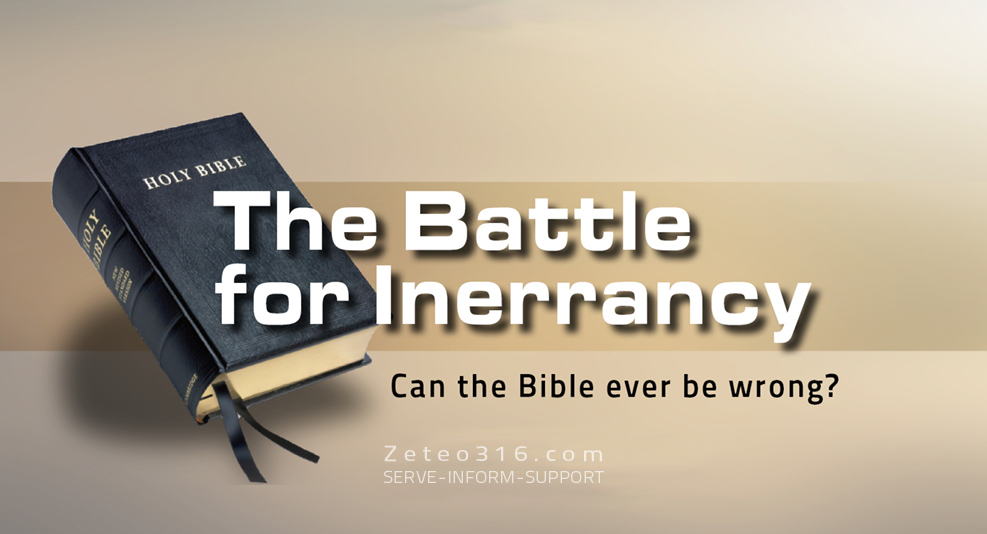The battle for inerrancy isn’t new. It is a cyclical battle which has dogged the church for centuries. You might even say that the questioning of God’s inerrant word first occurred in the Garden of Eden when the serpent modified God’s instructions to Adam. The issue has become a battleground for Christians once again.
Attacks on inerrancy have come from liberals such as Thom Stark’s book The Human Faces of God. The Associates for Biblical Research responded to Stark HERE and Denny Burk responded to him HERE.
According to Defending Inerrancy:
….inerrancy, simply means that the Bible is without error. It’s a belief in the “total truthfulness and reliability of God’s words” (Grudem, Systematic Theology, Inter-Varsity, 2004, 90). Jesus said, “Your word is truth” (John 17:17). This inerrancy isn’t just in passages that speak about salvation, but also applies to all historical and scientific statements as well. It is not only accurate in matters related to faith and practice, but it is accurate and without error regarding any statement, period (John 3:12).
The problem is that there isn’t a universal agreement among conservative Christian scholars on what inerrancy really means. You may find one theologian making the case for one definition but then discover that his version doesn’t align itself with that of other scholars. One example of this is Dr. Craig Blomberg.
I first came across Blomberg through a speech he wrote for Denver Theological Seminary. It was titled “Inappropriately Privileging Israel: Why Historic Premillennialism Trumps Dispensationalism” and I blogged on it HERE. He attacked some of the tenets of dispensationalism and used Israel as one of the battering rams. As I listened to the talk (delivered by Gary Hoag) I realized that he didn’t approach Scripture (especially the Old Testament and prophetic passages) in the same literal fashion as dispensationalists did. The Bible makes explicit and clear statements about national Israel’s future but Blomberg treated some of these texts as figurative, rather than literal. This may be said to be a matter of interpretation,
However, some time later I came across debates on inerrancy involving Blomberg, Mike Licona, Robert Gundry, Norm Geisler and others. In heated discussions, Blomberg and Licona questioned the literalness of events such as the resurrection of the saints in Matthew 27:51-53 and the fish-coin story. They suggested that these may not have actually occurred. Interestingly some scholars defended Licona and Blomberg.
So here we have an issue – the Bible tells us that saints were resurrected following Christ’s resurrection. Shouldn’t we simply trust the biblical account or is there some academic technicality to consider? Dr Geisler responded HERE
Blomberg also wrote a book titled Can We Still Believe The Bible?- An Evangelical Engagement with Contemporary Questions. The problem is that Blomberg raised even more questions than the book presumably was written to settle. For example, he appears to base his interpretation of the creation account on so-called scientific evidence. Where the “evidence” doesn’t match the Genesis account, he tweaks the biblical interpretation to suit it. William Roach discusses some of these issues HERE
Excerpt:
…Blomberg has leanings towards figurative approaches to Genesis and the historicity of Adam and Eve. His views are more closely aligned with naturalism and evolutionism than a biblical view of Creation.
Many evangelicals are allowing “scientific evidence” to inform their understanding of biblical creation accounts. Christian apologist William Lane Craig also has attacked Young Earth Creationists because he thinks “scientific evidence” proves a long age earth. Therefore he reinterprets Genesis accordingly and arrives at another definition of inerrancy (different to the statement above). Creation Ministries International has responded to him HERE
But on what terms should Christians define inerrancy? See Dr. Paul Henebury’s A Theological Case for Inerrancy Part One, Part Two and Part Three.
Excerpt:
The battle over the inerrancy of Scripture hasn’t and isn’t going away. We must decide how we will approach the Bible – what our working assumptions will be. If “all Scripture is God-breathed” then all Scripture has the insignia of God upon it. This would be the bare-bones theological deduction from the relationship between the two. For the human element to be lifted above the Divine element so as to enjoy equal ultimacy over the resultant production of Scripture requires an alteration to Scripture’s own self-witness. This is the reason why those who reject the idea of inerrancy (and I am far from rejecting all their work on account of their error), often plead in the vacuum of unaided reason.
John MacArthur’s The Master’s Seminary recently convened a summit of speakers to meet and discuss the latest serious assaults on inerrancy. You can find all the lectures HERE.
This issue of inerrancy is one which all Christians should become aware of. It impacts what elements we choose to believe from our Bible as God’s inerrant word. This issue has potentially far-reaching ramifications for trusting all of God’s message. If we don’t trust the source then we can ultimately make it say anything we want it to.
Addendum:
Some have noted that we mustn’t conflate inerrancy with hermeneutics. I agree to some extent. However, I don’t believe the two can be entirely separated insofar as the inerrancy debates. I think that there are entanglements which unavoidably affect some definitions of inerrancy.
One way to deny an explicit biblical statement is to appeal to a variety of genre. For example people will argue that we must not be “literalistic” with prophecy; hence, the OT promises to Israel are not going to be fulfilled as stated – they are fulfilled by the church. Therefore, they argue, this is not a case of inerrancy, it is one of interpretation. Similarly, William Lane Craig and others have made arguments regarding interpreting the “poetry” of Genesis. They do not take all of Genesis as literal (as opposed to “literalistic”) but consider the Bible to be inerrant.
I think that’s a problem and others agree: The authority of Scripture

